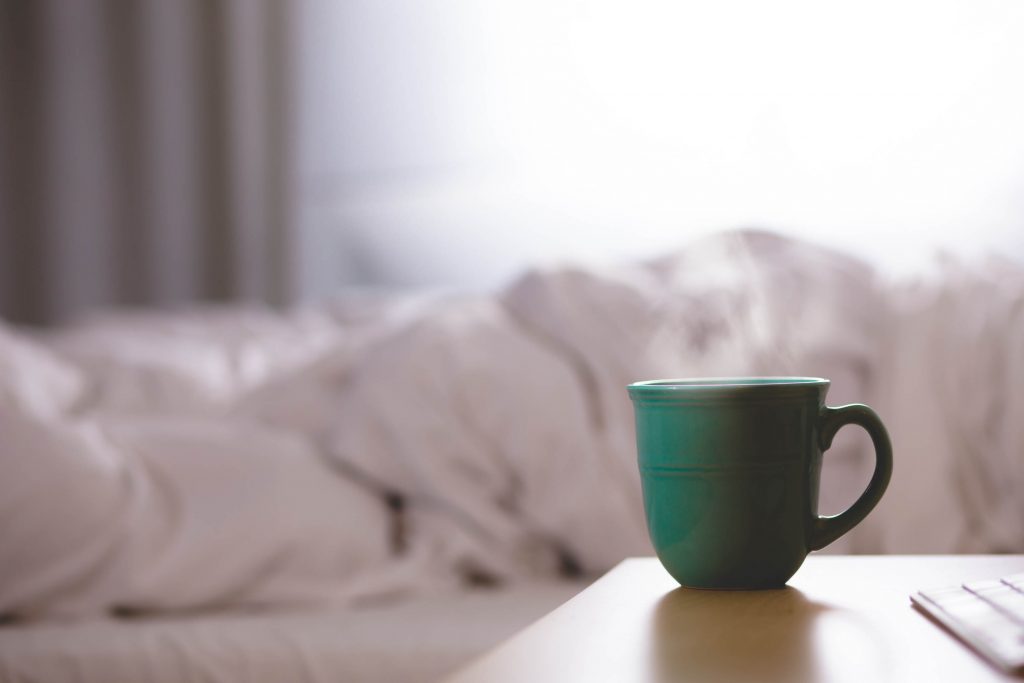Why do you need to prioritise sleep? During the night your pulse lowers, the body temperature sinks, breathing becomes heavier, the digestive system slows down and your brain activity decreases. It is in this state that your body resets and heals itself. When you are awake there are a million things your body needs to deal with: everything your senses pick up, all the food you eat, your muscles and bones moving, brain activity etc. Even just lying on the sofa watching Netflix is stimulating your body. The images on the screen have more effect on you then you may think. You may think it’s possible to outsmart your body with resting in front of the tv, stimulate it with caffeine or sugar, but the biological process has gone on since long before you and I were born so unfortunately, you won’t win that battle in the long run.
I know for myself that it’s easy to fall into the “I can sleep when I’m dead” mindset and to go for that “always hustling” kind of lifestyle. Even though we are living longer than the generation before us, it is like we are more scared of not having enough time. Lack of quality sleep is a big issue and it has been linked to diseases such as diabetes, obesity, mental disorders, cancer, cardiovascular diseases and hormone imbalance. It decreases your immune function which makes you more prone to flus and colds. Due to the stressful environment that most of us are living in, sleep is more important than ever. It’s one of the best ways to get out of our fight-or-flight mode, and into a rest-and-digest mode. It is the foundation for your wellbeing.
Important to note is that getting more hours of sleep is not necessarily the answer. What you need to focus on is quality more than anything. Even if you get 8-9 hours of sleep each night, if it’s interrupted or not deep enough then the magic is not fully happening. Studies have shown, that when the brain is fully resting, there is a washing process that flushes your brain. Meaning it is cleansing itself. We also know that this process happens in your stomach after 5 hours of not eating. It’s during the REM sleep that your memory is being stored which is one reason light sleep is not fully enough for keeping your brain well.

Before going into what you can do to improve the quality of your sleep and also boost your health, let’s start with looking into what affects it negatively.
Nutrition: food that puts pressure on your body and makes it work harder, prevents it from fully resting. This can include (but is not limited to) things like heavy oils, processed food, overconsumption of sugar etc. Also eating too close to bedtime takes your body out of the rhythm. It gets your digestive system going instead of starting to relax as it should during night time. Consumption of alcohol and caffeine in the evening has the same negative effect.
Light: Your body’s energy naturally follows the sun. We wake when it rises and sleep when it goes down. Artificial lights can trick your body and make it fall out of this rhythm. Looking at a tv screen, computer or phone in the evening raises your XXX which increases your energy. Scrolling through your phone before bedtime is like looking into the sun.
Lifestyle: Stress and stressful events can’t be fully avoided, they are a part of life. What you do with the situation, however, is up to you and dealing with it in some way is necessary. When you are stressed, your adrenal glands produce cortisol which takes your body into fight-or-flight mode. As mentioned before, this is the opposite state from resting and will have a negative impact on your overall wellbeing. Also if you are living an inactive lifestyle where little to no movement is made on a daily basis then this will also affect your sleep negatively.
How do you improve the quality of your sleep?
- Turn off all screens with blue light 1.5 – 2 hours before going to bed. Even dimming the lights in your home helps the body to relax.
- Eat your dinner earlier. Try to aim for 3-4 hours before bedtime
- Get plenty of movement in during the day. This helps to get rid of energy so you will fall asleep easier and also you’ll be sleeping better due to the increase in slow waves during the deep restorative sleep phase.
- Create a regular sleep routine where you go to bed and wake up around the same time each day. This helps your body to get into a habit.
- Make your bedroom a sacred and calming place. Remove clutter, tv devices and mobile phones (if you need yours for an alarm clock then have it on aeroplane mode or at least turn off the wifi). Decorate the place so it brings you calmness and harmony. Try to avoid working or eating in your bed as well. It should be a place for rest and deep sleep.
If you need help to improve the quality of your sleep, please reach out to me and let’s see how we can work together!
